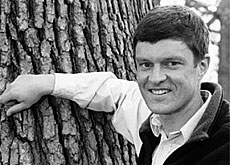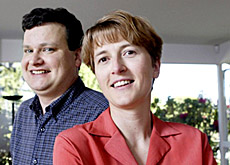Lausanne institute lures top scientist

Lausanne’s Federal Institute of Technology scored a major coup recently when it persuaded one of the world’s top environmental scientists to join its ranks.
Marc Parlange, who teaches at the prestigious Johns Hopkins University in the United States, told swissinfo that he hopes to influence the next generation of policy makers.
Parlange, an American citizen, is a leader in the field of environmental engineering, especially management and protection of water resources.
swissinfo: What persuaded you to make the switch to Lausanne?
Marc Parlange: I got a sense that the institute is a very good school that has made a clear decision to go after researchers and create a kind of culture that I like. It will become very much an American-style university, but in a country that pays a lot of respect to education and the environment.
Part of the decision to move was difficult because I’ve had a good time in the United States and at Johns Hopkins. It has a very open, very intellectual environment where there is a lot of collaboration. But I see the same potential in Lausanne.
swissinfo: By leaving the United States, aren’t you concerned you might put the brakes on your career?
M. P.: Certainly it will slow things down a little bit, but that always happens when you change environment.
I believe that the institute, if everything comes together as planned, could be one of the great research universities worldwide and get mentioned in the same breath as top US and European schools.
There has been this tendency to think about going to the US, which has always been good to young faculty. The tenure-track system has allowed young professors to build their own research programmes.
The people in Lausanne are aware of this system and are working to establish this. The structural changes afoot there will make a big difference and that’s why I think I can ultimately succeed at the institute.
swissinfo: Swiss universities are not renowned for being particularly flexible when hiring. Were you able to impose your own terms?
M. P.: The institute essentially gave me a clean slate. They asked what I would like to do and I explained to them the type of research and teaching I would like to carry out. My feeling is that anything is possible; I never felt I was being given recommendations about what I should do.
swissinfo: Water resources are the main focus of your work. Do you feel your research and teaching can influence decisions about the use of those resources?
M.P.: In the research community there is a tendency for scientists to stick to their work, and only a small number are prepared to get involved in the political policy side.
On the other hand, many of our students choose not to stay in research but to take on policy roles, so they have an impact on the wording of new laws and guidelines. Much of our work as researchers is to educate the next generation of policy makers and researchers who will work for government.
swissinfo: Your field of research carries political implications. Would you describe yourself as eco-friendly?
M. P.: Yes. But I’m also open to the idea that people need to have a livelihood. I don’t think we can have a perfectly sustained environment, because we tend to degrade it simply by existing.
I find that the way people live and industry is organised in western Europe is done in a much more sustainable way than in the US. There’s a strong awareness in the US that we could learn a lot from the way the Europeans have organised life in a healthy environment and at the same time allowed some kind of growth and development.
swissinfo: Do you aim to transmit this awareness to your students and colleagues?
M.P.: I think you do it naturally, through interacting with your students and colleagues. As a faculty member, the most fun part of my job has been working with the students, as well as the most rewarding.
I would say I am trying to spark in my students some sense of social responsibility and social justice towards their fellow human beings and the environment.
swissinfo: How strong is your commitment to Lausanne?
M. P.: It’s a big change for my family, and we’ve reached a point where we cannot consider moving around much more. It’s hard to predict the future, but the idea is to stay in Lausanne until the end of my career.
swissinfo-interview: Scott Capper
Marc Parlange has been a full professor at Johns Hopkins University in Baltimore since 1996, where he teaches hydrology and environmental fluid mechanics.
His academic career has taken him from Australia, where he graduated with a degree in applied mathematics. He earned his PhD in environmental engineering at Cornell University in the United States.
His teaching career started at the University of California-Davis in 1990 as an assistant, then later as an associate professor.
He is recognised for his pioneering work in the fields of land-atmosphere interaction and hydrology.
Parlange spent the 2002-2003 academic year on sabbatical at Lausanne’s Federal Institute of Technology.

In compliance with the JTI standards
More: SWI swissinfo.ch certified by the Journalism Trust Initiative










You can find an overview of ongoing debates with our journalists here . Please join us!
If you want to start a conversation about a topic raised in this article or want to report factual errors, email us at english@swissinfo.ch.